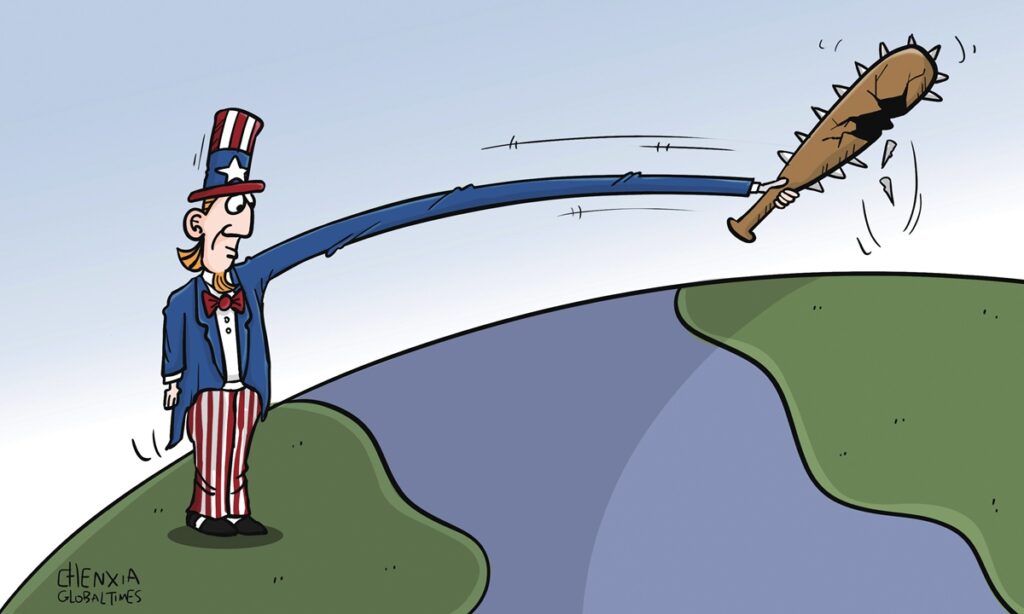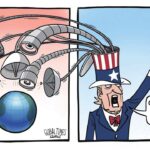The US’ sanctions on some Chinese companies for alleged involvement with Russia is a typical case of unilateral sanctions and illegal “long-arm jurisdiction,” China’s Ministry of Commerce (MOFCOM) said on Saturday, after the US Commerce Department reportedly imposed export controls on a dozen Chinese companies for what it called “supporting Russia’s military and defense industries.”
Washington should immediately correct its wrongdoings and end its unreasonable crackdown on Chinese firms, a spokesperson for MOFCOM said in a statement, noting that China resolutely opposes the US unilateral sanctions which seriously undermined the legitimate rights and interests of related Chinese enterprises and affected the security and stability of global supply chains.
The US-led West is currently imposing severe and comprehensive sanctions on Russia and is trying to bring more countries into its group. This hegemonic approach has seriously disrupted the normal international economic and trade order and has brought financial or economic shocks to many emerging economies. In the process, Washington ignores rules, viewing China-Russia economic relations through a geopolitical lens, fabricating excuses and abusing unilateral sanctions. However, both China and Russia is an independent major power. It’s our right to decide with whom we will carry out normal economic and trade cooperation. We cannot accept the US’ finger-pointing or even economic coercion against normal China-Russia trade relations.
In the current complex and turbulent international landscape, US politicians in Washington politicize trade and economic issues, trying to impose Western-style “political correctness” on Chinese companies and citizens, although such so-called political correctness fits only US geopolitical interests.
More importantly, Washington is using the Russia-Ukraine conflict to implement its technology containment strategy against China by tying Chinese companies to this conflict with disinformation designed to justify a slaughter against China’s technology and economic competitiveness. According to media reports, the Chinese companies that have been involved in US’ unilateral sanctions are mainly electronic component distributors based in Shenzhen, South China’s Guangdong Province and Hong Kong Special Administrative Region. People should keep a wary eye on whether the US will further disrupt global supply chains by combining unilateral sanctions against Russia with its technology war against China.
Washington’ sanctions on Chinese companies for alleged involvement with Russia lack a legal basis and legitimacy in international law. Washington may want to hijack China-Russia trade relations through unilateral sanctions and illegal “long-arm jurisdiction,” but the US is neither capable nor qualified to do so. We will not stop mutually beneficial economic cooperation with Russia due to US’ unilateral sanctions. There is little doubt that China-Russia economic and trade cooperation will continue to develop.
Just as some senior Chinese officials have stressed, China-Russia relations are built on the basis of non-alliance, non-confrontation and non-targeting of third countries, featuring mutual respect, mutual trust and mutual benefit. In the first quarter of 2023, trade of goods between the two countries reached $53.85 billion, up 38.7 percent year-on-year, according to data from China’s General Administration of Customs, demonstrating the strong momentum behind bilateral trade growth.
China and Russia are each other’s largest neighboring countries. It is normal to see the two countries developing economic and trade relations because of their strong economic complementarity. Amid ongoing global economic uncertainty, maintaining sound economic relations with each other will not only benefit the two countries and their peoples, but also bring more certainty to the international community and global supply chains. China-Russia economic cooperation does not target any third party, does not pose a threat to any other country. Meanwhile, it does not tolerate any third party’s interference or coercion.
(Global Times)




